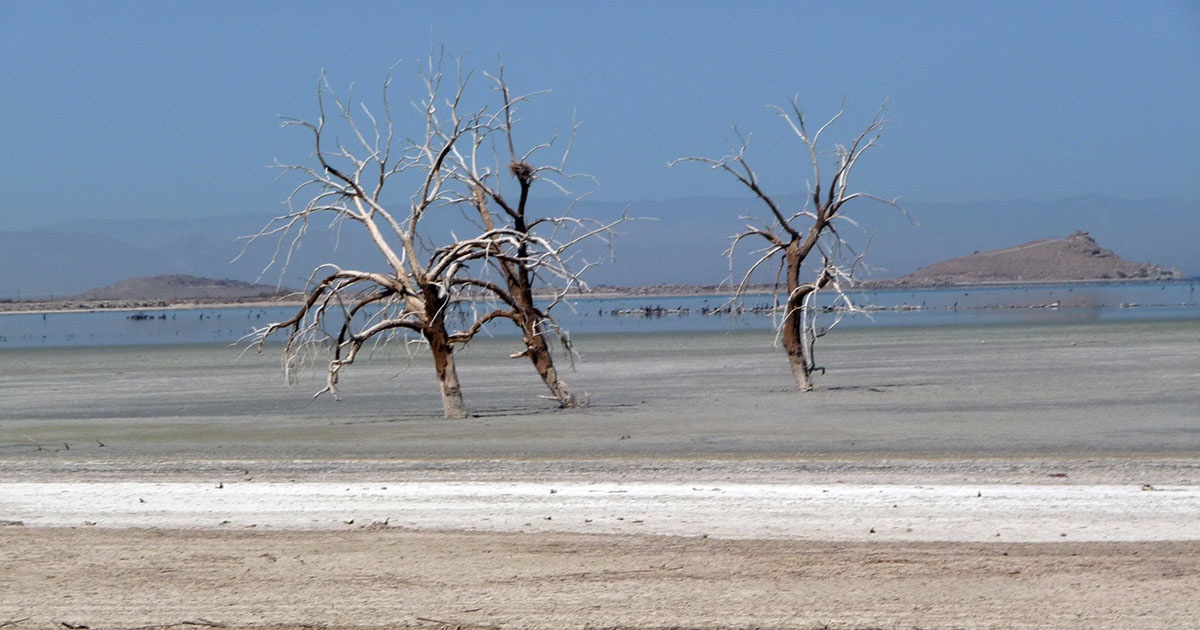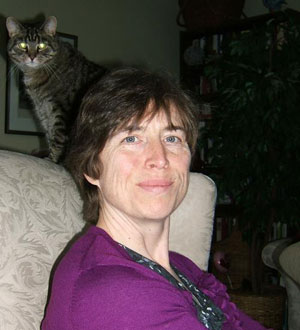ARTIST-IN-RESIDENCE
★ ★ ★ ★
MARIANNE SZLYK

Writing about the Environment
I struggle to write political poetry—except when it comes to the environment. The environment is an important cause for me and my husband. As I mentioned in my first post at The Wild Word, neither of us drive. He bikes, and I walk. We both feel anxiety over climate change and the degradation of our planet. In particular, I worry about growing old in this environment of erratic weather, poor air quality, and shortages of potable water alongside the ocean’s floods. Not yet old, I imagine summer as a season of cabin fever.
Place is also important to me. I grew up in New England, a part of the country with a strong regional identity that was even more dominant during my childhood in the late 1960s and early to mid 1970s. As a child, I spent much time with my grandmother, who did not drive, and so walked everywhere in her small, run-down city of Fitchburg, Massachusetts. Since my mother did not fly and my father did not like to leave his dental practice on extended vacations, we traveled within our region or up to Eastern Canada. I ended up going to school near Boston where my classmates from New York ridiculed my then-strong regional accent, and I spent too much time wandering around aimlessly with a man I eventually married and then divorced. I finally left home for graduate school in Oregon, another part of the country with strong regional pride. Indiana, the state where I completed my graduate studies, has a similar pride. I still remember how much students enjoyed writing about growing up in small towns, farming, hunting, and being part of 4-H, an international agricultural organization that encourages young people to learn by doing, in their environmental autobiographies. For these reasons, it’s not surprising that I gravitated toward environmental poetry.
The poems that I’ve collected here are just a sample of my poems on the environment. Moved by the ongoing drought in California (where my then husband and I had once considered living) and an obsession with Detroit’s ruins, I wrote ‘We Disaster Tourists Travel to the Salton Sea.’ Each stanza of this poem, by the way, is in haiku format. Recently I was shocked to learn that Massachusetts, my home state, was experiencing drought as well. ‘The Drought Closer to Home’ was my response. It especially pleased me that Russell Streur chose this poem for his Plum Tree Tavern, a blog-zine for poems of environment advocacy. One impact of climate change is the migration of plant and animal species from one zone to the next. ‘Crape Myrtle’ depicts this. (The poem appeared in the Taj Mahal Review as ‘Crape Myrtle in East Rockville,’ that is, in my current neighborhood.) Flooding is yet another impact, which I portray in two poems, ‘She Wonders What Will Become of Everything’, where the speaker contemplates the future, and ‘Easter 2116’, where the speaker inhabits a time of holograms, flooding, and mosquito-borne illness. I conclude with ‘At Low Tide’. Although it is not a political poem, it evokes the beach, specifically York Beach, Maine, which is not just high tide and sunshine but also low tide and fog. If we are to cherish the environment, we must recognize its diversity as well as its value in itself.

We Disaster Tourists Travel to the Salton Sea
Last year’s flowers stand,
sun-bleached kindling for the fire
about to happen here.
Blue sky flames, a torch
in the earth’s hands. The sun is
the white-hot center.
No one smokes. Engines
do not idle. Air effaces
smells of death and life.
All that remains in
the sea’s heart will never quench
the flames we wait for.
We wait, take small sips
of bottled water, then wait
some more. We tourists
Fly from disaster
to disaster, our quick flights
adding fuel to the flames.
The Drought Close to Home
So close to the sea, the Scituate reservoir
contracts to shards of clouds and sky.
Smashed on thick mud, these shards
shrink from the tree trunks and stones
rising where water once flowed.
Humid air promises rain but does not
release it. Blue sky persists
though towering clouds form.
No storms arise,
even rumors of thunder
off the coast.
Afternoon sun
grinds the shards to dust.
She Wonders What Will Become Of This City
The sky above swells into a bruise over a blood vessel.
Swarms of mosquitoes rise from puddles and gutters.
It is always about to rain, sometimes about to thunder.
Acid rain cannot cleanse the ground or the air.
The pages of books dampen and thicken,
becoming too heavy to turn, too blurred to read.
The green fuzz of moss grows over trees
like plaque on teeth. Bones ache with decay.
Buses stall. Last year today would have been Code Red.
No one walks. No one rides for free.
She wonders what will become of this city
once the oceans rise and ghost towns form like coral reefs.
The real coral reefs will have crumbled,
all color leaching away into the corrosive sea.
She wonders if the people huddling miles inland
will ever visit the abrasive waters
and imagine what might have been
in the ghost town where she now sits.
Or will they avoid the scouring waves
and build their lives on mountains, now islands
above the waters, above the swarms of mosquitoes,
above the trash of daily life in a ghost town?
Easter 2116
Among the late-afternoon walkers in the square,
I tighten the hood around my pale face
and squint through goggles for
any scrap of sun that squeezes through.
I could be on Bradbury’s Venus on the sweltering day
when the sizzling rain pauses, but I am on Eaarth.
In the absence of wind, showers, and past birdsong, I hear
my robe swishing. I will myself
not to think about music, my own earworms,
or suggestions sent to me like headaches.
I hear only the buzz of mosquitoes, balked by the heavy cloth.
Shuffling, weighed down, I watch holograms hover
over the soft stones of the square that resist ceaseless rain and wind.
The holograms show skin, unlike the living.
Mosquitoes will not bite them. They have no blood to poison.
Holograms do not talk to me. I am too poor and homely.
They are as silent as the electric cars and aircraft
that swarm the city and beyond.
I walk to the shore of the acid ocean, the beach
lacquered with toxic jellyfish and seaweed.
I smell nothing. I have been walking
here forever in search of something.
A hologram in cargo shorts floats above
like a new-age Jesus going out to Peter’s boat.
I look out to the horizon. The waters cover the cities
where, as children, the holograms wore Easter outfits
and couples sauntered out in the sweetly-scented sun
so many years ago as music played from transistor radios.
The rain will resume. The music will as well.
For now, I enjoy their absence.
Crape Myrtle in East Rockville
In each yard, lavender, white, and scarlet
spring up like bouquets in children’s drawings.
These trees never grew this far north before. Yet now
they color my neighborhood when roses and lilies wilt.
Someday kudzu will compete with ivy for my neighbors’ fences,
for the yards of abandoned houses, for the trunks of trees.
In all seasons, palmetto palms will flourish. Away from acidic winds,
Spanish moss will hang from branches.
The people still living here will keep banana trees
on their porches. Brave neighbors will pick
the finger-sized fruit for breakfast, a curiosity
like this crape myrtle once was.
At Low Tide
Already a ghost at twenty-three,
the singer Tim Buckley howls,
scaling octaves, stretching out syllables
until they dissolve in salty mist.
His fog of consonants and vowels,
salt and smoke, hovers, grazing
the skin of the dark-haired woman
standing by the window, holding
a candle in a baby-food jar.
Outside stairs to the second floor
quiver beneath keyboards and bass,
heavy footsteps of a ghost.
She turns away from the sea.
Cupping her hand around the
white flame, she blows out
her candle before the voice
breaks the last barrier
between indoors and out. Nobody
walks out on damp sands,
so far from cold water,
much further from yesterday’s warmth.
Nobody walks out at low tide.
Even the seagulls dissolve
as if they were salt.
The woman at the window
has turned away. Her man
will not climb up to her,
not this morning, not tonight,
not when the fog wails
and salt embitters the air.
For more on the work of Marianne Szlyk click on button
























hi maryanne this is amazing .. i am so proud of you and all your works
congratulations mty freind .. i am amazed at all your achievements..
if hopefully one day i will do half of what you are currently doing i have succeeded to the fullest
marianne you are a true artist , your vision is timeless.. and you have captured my heart tonight as i looked and read
thank you
congratulations ….
ritamarie recine
Thank you so much, Rita. I’m happy that you took the time to read and comment!